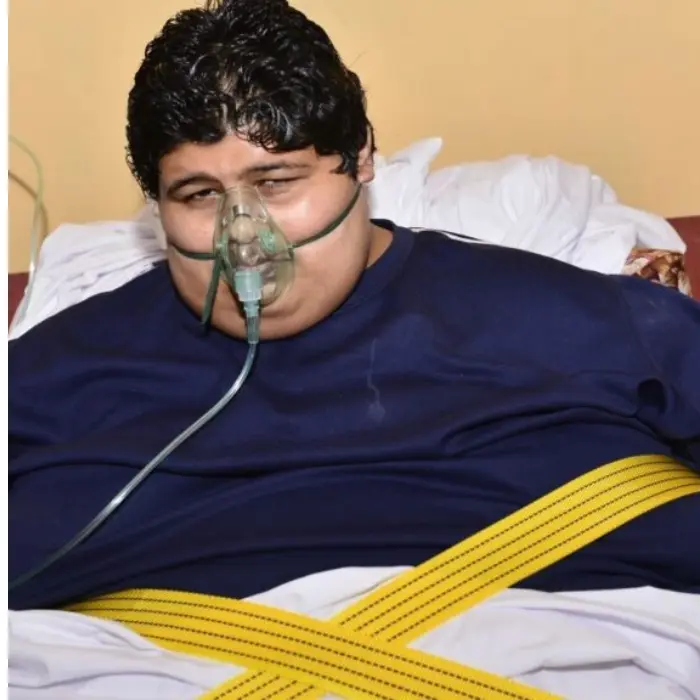Khalid bin Mohsen Shari’s Incredible 1100-Pound Weight Loss, transforming his health and life. An inspiring story of resilience and the power of determination.
Introduction Khalid bin Mohsin’s weight loss journey:
Khalid bin Mohsen Shari’s Incredible 1100-Pound Weight Loss” Khalid bin Mohsen Shaari (Arabic: خالد بن محسن الشاعري; born on February 28, 1991) is a Saudi Arabian individual who, in August 2013, was recognized as the heaviest living person and the second-heaviest person ever recorded, weighing 610 kg (1,340 lb; 96 st), following Jon Brower Minnoch . Through medical intervention, he successfully reduced his weight by 320 kg (710 lb; 50 st)—over 50% of his total body weight—in just six months. But Khalid bin Mohsen Shari’s weight loss journey is very hard . But it was very beneficial.

Khalid bin Mohsen Shaari: An Inspiring Transformation from Severe Obesity to Health
Khalid bin Mohsen Shaari, a native of Saudi Arabia, has garnered international recognition for his remarkable transformation from severe obesity to a much healthier lifestyle. His journey exemplifies the effectiveness of medical treatment combined with personal determination, serving as a powerful illustration of how systemic support and individual effort can result in significant change. Khalid’s experience emphasizes the necessity of a comprehensive approach to tackling severe obesity and its broader implications for overall health and well-being.
Background and Struggles with Obesity
Born in 1991 in Saudi Arabia, Khalid bin Mohsen Shaari encountered weight-related challenges early in life. As he matured, his weight escalated, culminating in severe obesity. By his late teenage years, his condition had deteriorated to the point where he could not leave his home without assistance. At his peak, his weight was reported to be an astonishing 1,345 pounds (610 kilograms), positioning him among the heaviest individuals globally.
The consequences of Shaari’s extreme obesity were significant. His mobility was drastically restricted, necessitating assistance for everyday tasks. His health faced serious threats due to various complications linked to such excessive weight, including heart disease, diabetes, and respiratory problems. The physical, emotional, and social hurdles he encountered were substantial, impacting not only his own life but also the lives of those around him.
Medical Intervention and Initial Steps Towards Recovery:
In 2013, Khalid bin Mohsen Shaari’s case drew global attention, prompting the Saudi government to provide him with urgent medical care. He was transferred to a specialized facility where a comprehensive treatment plan was developed, involving a team of experts—endocrinologists, nutritionists, and surgeons. The goal was to address both his obesity and underlying health issues. A key focus was managing his metabolic conditions, and he underwent extensive assessments to identify effective strategies for weight management and overall health improvement, including evaluations of his cardiovascular, respiratory, and endocrine health.

Surgical Intervention and Weight Loss Procedures
In 2014, Khalid bin Mohsen Shaari underwent a series of significant medical procedures designed to promote weight loss. One of the most crucial interventions was bariatric surgery, often regarded as a last resort for individuals with severe obesity who have not achieved success through other weight loss strategies. For Shaari, this surgery represented a vital step in his quest for a healthier weight.
The specific bariatric procedure he underwent was gastric bypass surgery. This operation entails reducing the stomach’s size and rerouting the digestive tract to restrict food intake and nutrient absorption. Gastric bypass surgery has proven effective in facilitating substantial weight loss and improving associated comorbid conditions linked to obesity.
In addition to gastric bypass surgery, Shaari received further medical interventions aimed at supporting his weight loss journey.
Shaari’s voyage was not without difficulties, though. There were several challenges associated with the substantial weight loss and the change to a healthy lifestyle. He needed to learn how to deal with the psychological components of his weight loss quest, include regular exercise into his routine, and manage the complexities of a new diet.
To further limit any potential problems from his rapid weight reduction, his medical staff closely monitored his health. The change
The Importance of Support Systems
Khalid bin Mohsen Shaari’s path to losing weight highlights the critical role that a robust support system plays in both achieving and sustaining significant health improvements. During his weight loss journey, Shaari was supported by a diverse group of people, including medical professionals, family, and the wider community.
Broad-Reaching Effects and Acquired Understanding
The life of Khalid bin Mohsen Shaari provides profound insights into the complexities and tactics of treating extreme obesity. His trip illuminates several important insights and their wider ramifications for the wellness and health sector:
All-Inclusive Strategy: Shaari’s situation highlights the necessity of treating severe obesity with a comprehensive strategy. A good treatment program should incorporate a number of strategies, including medical attention, lifestyle modifications, and mental health assistance.
The Importance of Proactive Management and Quick Action: Treating and combating severe obesity requires both proactive management and quick action. Shaari’s tale demonstrates the advantages of prompt medical attention and the favourable outcomes that follow early engagement.
Conclusion:
Khalid bin Mohsen Shaari’s journey from extreme obesity to significant weight loss highlights the power of medical intervention, personal determination, and strong support. His story demonstrates how those facing severe health challenges can overcome obstacles and achieve transformative changes with the right resources. Shaari’s experience also emphasizes the need for a comprehensive approach to addressing obesity, helping us understand the challenges of this condition and the importance of compassionate and innovative care. His journey is an inspiring reminder that with the right approach, meaningful health improvements are possible.
Biography
Khalid bin Mohsen Shari was born in Saudi Arabia on February 28, 1991. At the age of 22, he earned the title of the “fattest man alive,” with a body mass index (BMI) of 204.
In 2013, King Abdullah of Saudi Arabia instructed him to travel from his residence in Jizan to King Fahd Medical City in Riyadh for a comprehensive program focused on diet and physical activity aimed at facilitating his weight loss. Remarkably, during his weight loss journey, he was able to walk for the first time in five years in February 2016, using a walker. By November 2017, he had successfully shed 542 kg (1,195 lb; 85.4 st), bringing his weight down to 68 kg (150 lb; 10.7 st). In January 2018, he underwent his final surgeries to remove excess skin.
Khalid bin Mohsen Shari’s Incredible 1100-Pound journey is an inspiring reminder that with the right approach, meaningful health improvements are possible. Born in Saudi Arabia on February 28, 1991, Khalid earned the title of the fattest man alive at the age of 22, with a BMI of 204. Following a comprehensive program in Riyadh, he successfully shed 542 kg, bringing his weight down to 68 kg.
